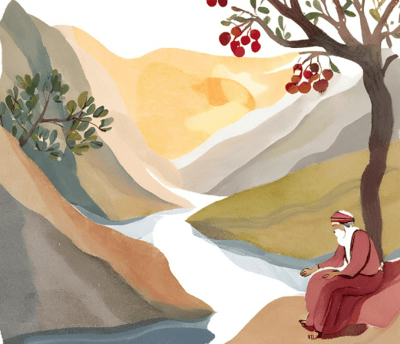The Man Who Worshipped for 500 Years
Story with Brief Commentary
Ali Ishtiaq
12/9/20243 min read


The Man Who Worshiped for 500 Years
The angel Jibra’il (AS) told the Messenger of Allah (SAW) about a man from the past who worshiped Allah (SWT) continuously for 500 years.
Allah (SWT) granted this man a shelter on top of a mountain surrounded by salty water. However, by Allah’s mercy:
• A stream of sweet water flowed through the mountain, which he used for drinking and ablution.
• A pomegranate tree grew, providing him with one fruit every day for sustenance.
One day, the man supplicated:
"Oh Allah, bring my death while I am in the state of prostration."
Allah (SWT) accepted his du’a, and whenever Jibra’il (AS) descended to Earth, he would find the man in prostration.
On the Day of Judgment, Allah (SWT) will instruct the angels to take this man to Paradise through His Mercy. However, the man will insist:
“I should enter Paradise through the good deeds that I performed.”
In response, Allah (SWT) will command the angels to compare the man’s 500 years of worship with the blessings he had received in the world. It will be revealed that his lifetime of devotion does not even equal the value of the gift of eyesight that was granted to him. Consequently, the angels will be ordered to take him toward hellfire.
At this moment, the man will desperately plead:
“Oh Allah! Enter me into Paradise only through Your Mercy.”
A Divine Dialogue
Allah (SWT) will then engage the man in the following conversation:
• Allah: Oh My servant, who created you?
• Worshiper: Oh Allah, You have created me.
• Allah: Were you created because of your good deeds or because of My mercy?
• Worshiper: Because of Your mercy.
• Allah: Who granted you the ability to worship for 500 years?
• Worshiper: Oh the Almighty! You granted me that ability.
• Allah: Who placed you on the mountain surrounded by the ocean? Who caused a stream of sweet water to flow in between the salty water? Who caused a pomegranate tree to grow for you? Who granted you death while in the state of prostration?
• Worshiper: Oh the Sustainer of the Worlds! You did all of these.
Allah (SWT) will then declare:
“All these have happened due to My Mercy, and you too will enter Paradise only through My Mercy.”
Exploring the Wisdom
Although this is a weak hadith, the lesson it conveys aligns with authentic prophetic teachings. As stated in a Sahih Hadith:
A’isha (RA), the wife of the Prophet (SAW), reported that Allah’s Messenger (SAW) said:
"Observe moderation in doing deeds. If you fail to do so perfectly, try your best and be happy. No one will enter Paradise based on their deeds alone."
The Companions asked: "Not even you, O Messenger of Allah?"
He replied: "Not even I, unless Allah wraps me in His Mercy. And bear in mind that the most beloved deeds to Allah are those done consistently, even if they are small."
(Sahih Muslim, Book 52, Hadith 75)
This story unveils a deeper truth about the human condition and the nature of divine grace. The man, despite his 500 years of unbroken worship, stands before Allah, only to realize that his deeds—no matter how vast—are utterly insignificant before the boundless magnitude of divine blessings. His breath, his sustenance, the very faculties that enabled his devotion were all gifts, granted to him without price.
Herein lies the great paradox of servitude: no act of worship, no lifetime of devotion, can ever be commensurate with even a single divine blessing. If justice alone were the measure, no soul would stand redeemed, for we are forever indebted, existing only by His will. And yet, Allah, in His infinite mercy, does not seek equivalence—He seeks recognition, humility, and surrender.
This story strips away the illusion of self-sufficiency. It warns against the subtle arrogance of believing that piety itself is a currency that can "purchase" salvation. True devotion is not in the tallying of deeds but in the realization that all goodness stems from Him, and all salvation returns to Him. Even the Prophet Muhammad (SAW), the best of creation, declared that he, too, would enter Paradise only through Allah’s mercy.
Thus, the highest state of worship is not mere action, but a heart overwhelmed by gratitude and a soul that surrenders to divine mercy. It is not in the weight of deeds but in the recognition of our own insufficiency that we truly draw near to Allah.
Let this serve as a reminder: seek excellence in worship, but never believe it is your deeds alone that will save you. In the end, it is not what we offer to Allah that matters, but what He bestows upon us out of His infinite compassion.
Disclaimer: The author of the section "Exploring the Wisdom", Ali Ishtiaq, is not a scholar; therefore, his interpretation of the hadith should not be considered comprehensive. If any confusion arises or further clarification is needed, it is advisable to consult knowledgeable scholars.


